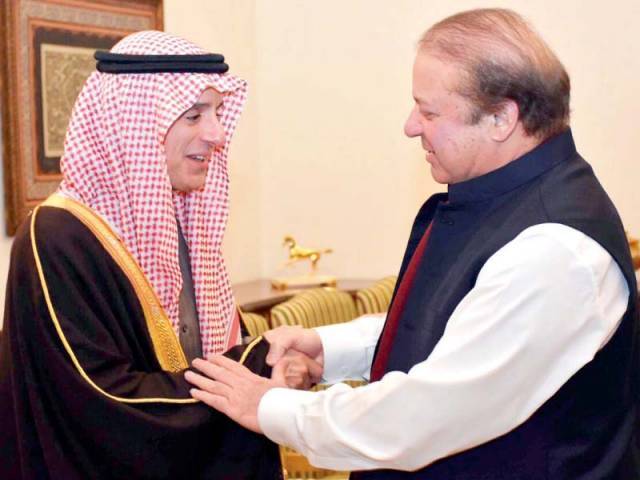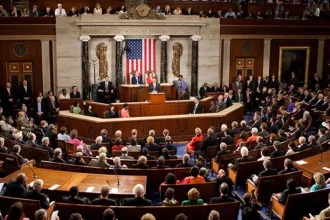Adel bin Ahmed al Jubeir travelled to Islamabad to brief Pakistan’s civil and military leadership regarding the purpose of the 34-nation coalition the Kingdom has cobbled together to fight terrorism.
Jubeir, who was to visit last Sunday but delayed his trip due to the rising tensions between his country and Iran, stayed in the capital for only five hours, during which he first held talks with army chief General Raheel Sharif and then Prime Minister Nawaz Sharif.
Detailed talks at the Prime Minister’s Office were attended by his adviser on foreign affairs Sartaj Aziz, National Security Adviser Lt-Gen (retd) Naseer Khan Janjua and other senior officials. The talks covered wide range of issues including the current regional scenario, particularly the escalation of tensions between Saudi Arabia and Iran as a result of the Kingdom’s execution of a prominent Shia cleric.
A statement issued by the Foreign Office said the Saudi foreign minister briefed Nawaz on details of the coalition announced by Saudi Arabia to fight terrorism.
The prime minister said Pakistan welcomes Saudi Arabia’s initiative and stressed that Islamabad supports all such regional and international efforts to counter terrorism and extremism. However, neither side shared details including as to what support and cooperation exactly Saudi Arabia was seeking from Pakistan.
The Saudi minister’s planned news conference with Sartaj Aziz was cancelled.
The FO said it was called off due to the delay in Jubeir’s arrival. However, the move was believed to have come at the request of the Saudi foreign minister, who apparently wanted to avoid any controversy.
A senior official with knowledge of the closed door discussions said Pakistan made it clear to the top Saudi diplomat that the government supported the Kingdom’s initiative because it was against terrorism.
The official, who asked to remain anonymous because of the sensitivity of the issue, said Pakistan would not become part of the coalition if it was against any country.
The 34-nation alliance does not include countries such as Iran, Syria, Iraq and Afghanistan. This has raised concerns that such a coalition will further create divisions within the Islamic countries. That is why Pakistan’s position on the alliance is still vague.
Sartaj Aziz said Pakistan’s defence minister will travel to Saudi Arabia later this month for detailed discussions on the subject.
The Saudi foreign minister told state-run PTV that he had ‘useful and constructive’ talks with Pakistani leadership. Jubeir said the two countries agreed to expand their bilateral cooperation in security and other fields.
Saudi-Iran tensions
The visit of Saudi foreign minister assumed greater significance in the wake of rising tensions between Riyadh and Tehran.
Jubeir briefed Prime Minister Nawaz on the recent situation in the Kingdom’s relations with Iran, said the foreign ministry statement. It said Pakistan expressed deep concern at the escalation of the situation and condemned the burning down of Saudi Embassy in Tehran.
“Pakistan believes in respect for international norms and adherence to principle of non-interference,” the statement added.
The prime minister called for resolution of differences through peaceful means in the larger interest of the Muslim unity in this challenging time. He affirmed that the people of Pakistan will always stand shoulder to shoulder with the people of Saudi Arabia against any threat to territorial integrity and sovereignty of the Kingdom.
Nawaz called for further strengthening and expanding bilateral relations between Pakistan and Saudi Arabia, in all fields of cooperation, including defence, security, economic and commercial cooperation. He also urged increased Saudi investment in Pakistan, especially in the energy sector where Pakistan offers attractive investment regime.
The Saudi foreign minister briefed the prime minister on the ongoing programmes to enhance Saudi investment in critical sectors of Pakistan’s economy.
The two sides also discussed ways to deepen bilateral cooperation in all fields. Both sides agreed to hold political consultations twice a year alternately in Islamabad and Riyadh.
In a separate meeting with the adviser, Jubeir was briefed on the successful campaign that Pakistan had waged against the twin menace of terrorism and extremism. The two sides underscored the need to develop jointly a counter narrative against extremism and terrorism with the help of ulema.
The two delegations also discussed regional and global issues of common concern. It was agreed that both countries would make a concerted effort to promote multi-faceted cooperation and work together to defeat our common enemy – terrorism and extremism.






